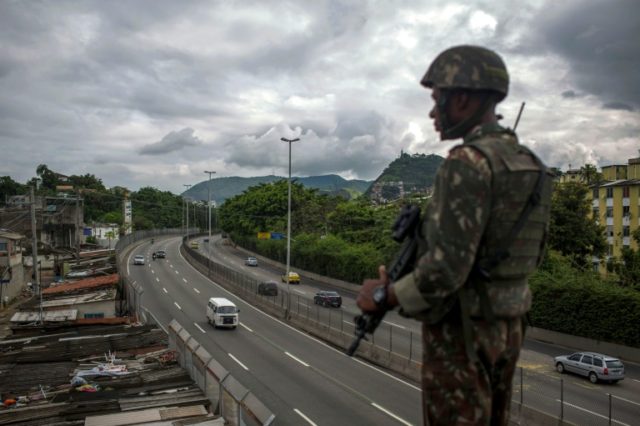Nearly two years after Rio de Janeiro police welcomed Olympics spectators at their airport with a banner reading “Welcome to Hell,” Brazilian President Michel Temer sent the nation’s military to take over the city on Friday, cracking down on a crime wave exacerbated by Carnival festivities and a woefully underfunded law enforcement corps.
Temer announced the intervention on Friday morning, deploying troops to the city and asserting that the Armed Forces, not the police, are now responsible for combatting crime in Rio de Janeiro. “Organized crime almost took over the state of Rio de Janeiro,” Temer said in remarks confirming the move. “It is a cancer that spreads throughout the country and threatens the peace of our people.”
“I take this extreme measure because the circumstances require it,” he concluded. “The government will give tough, firm responses and take all necessary steps to deal with organized crime and gangs.”
In addition to police work, the military will also be managing local fire departments and any intelligence activities and can arrest citizens if necessary. The man in charge of the operation, multiple outlets report, will be General Water Braga Netto, head of Brazil’s East Military Command. Before assuming that job, Braga served as a special adviser to the Rio Olympics on security.
“In practice, the officer will replace the governor of Rio, Luiz Fernando Pezão (MDB), in the area of security,” Veja notes.
The nation’s legislators will debate the specifics of the intervention throughout the day Friday, Folha de Sao Paulo reported, drafting into law the federal government’s proposal to extend the intervention through the end of the year.
The newspaper notes that the Brazilian Congress has ten days to pass a law legalizing the military takeover, or else Temer will have to withdraw his troops. A draft of the law exists, however, produced in a meeting featuring most major cabinet members and including the governor of Rio de Janeiro state, Luiz Fernando Pezão.
Pezão, reports various Brazilian publications, requested the intervention after a spike in crime during Rio de Janeiro city’s annual Carnival. “Rio can’t take anymore,” Pezão reportedly said in a meeting with federal officials, “Rio is in a state of calamity security-wise, we do not have an exit and we cannot wait another day.”
The governor declared the Carnival season a “failure.”
The Brazilian magazine Veja, citing O Globo, also notes that Rio de Janeiro’s website posted an explanation imposing what is essentially martial law.
“Even with the serious financial crisis that we suffered, we tried to value our police and other service members working security. … I will continue to dedicate myself until the end of my last day of government to improve and improve security in our state,” a message signed by Pezão on the website read.
Brazil’s constitution allows for such takeovers in the event of an emergency. This is the first time in the history of the 1988 constitution that such an intervention has occurred, however.
“A series of muggings, armed robberies, and confrontations” have rocked Rio de Janeiro during the annual Carnival season this month, according to ABC News, which notes that organized crime gangs have taken to fighting each other openly in the city’s streets. Criminals, many minors, have taken advantage of the influx of tourists that Carnival brings and engaged in armed robberies and muggings. Some have attacked police themselves, threatening them to avoid enforcing the law or risk their lives.
The crime spike began before Carnival. Two children, one three years old, died in gunfights just days before Carnival began, along with nine others.
Rio de Janeiro has suffered an endemic crime problem for years now, however, exacerbated by the fiscal crisis in part triggered by the millions the city and state poured into hosting the 2016 Summer Olympics. That year, police protests their near-total lack of resources, including being unable to afford basic items like pens and toilet paper. Local civilians provided donations of toilet paper to keep police stations running. The “welcome to Hell” sign was part of police and medical staff protests after not receiving paychecks for weeks, that money being funneled into the sporting event.
Police protests allowed criminals to act freely in Rio’s streets. Faced with chaos on the city’s streets, Brazil’s Secretary of Public Security José Mariano Beltrame lamented, “That is how Rio de Janeiro is.”
Then-acting governor of Rio de Janeiro Francisco Dornelles urgently requested $900 million in funding from the federal government, stating that the Olympics had brought Rio to the brink of “public calamity” and “a total breakdown in public security, health, education, mobility and environmental management.”

COMMENTS
Please let us know if you're having issues with commenting.